With India rapidly transforming into a major coffee consuming nation, coffee shops, roasters and producers are primed for extraordinary growth, reports Tobias Pearce
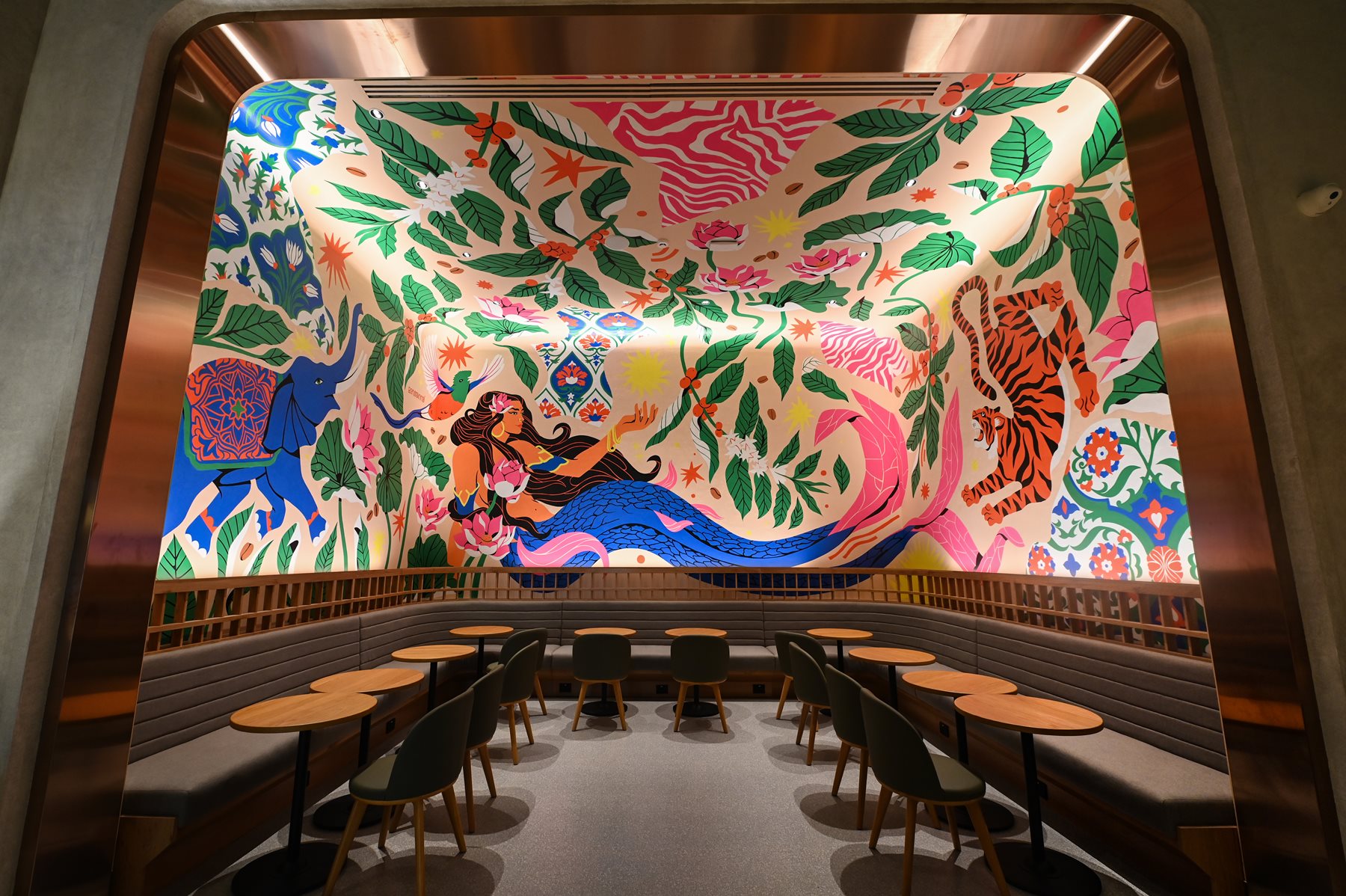.jpg.aspx?lang=en-GB&width=700&height=465)
Interior of India’s first Starbucks Reserve store, which opened in Mumbai in October 2022 | Photo credit: Tata Starbucks
India is a country on the rise. In April 2023 the South Asian nation officially overtook China as the world’s most populous country and more than half of its 1.43 billion citizens are currently under the age of 30. Achieving 7.2% full-year GDP growth in 2022-23, the world’s largest democracy remains on course to be among the fastest-growing major economies in 2024.
Making their mark on the global stage, Indian-origin CEOs now run some of the world’s most valuable and influential companies, including Microsoft’s Satya Nadella, Google’s Sundar Pichai, Novartis’ Vasant Narasimhan, and of course – Starbucks’ Laxman Narasimhan.
A nation of opportunity
Following rapid economic development over the past 50 years, Indian society is undergoing a major shift towards premiumisation. Young, educated, well-travelled and increasingly affluent consumers are embracing international lifestyle brands while fiercely championing a new era of home-grown entrepreneurship – and coffee is no exception.
“The Indian coffee landscape has witnessed significant transformation over the past decade,” says Adrit Mishra, Chief Operating Officer at Tata Starbucks, the joint venture that manages the US coffee chain in India.
“As India’s coffee culture grows, the appreciation for premium coffee is moving beyond major metropolitan areas,” he adds.
“Appreciation for premium coffee is moving beyond major metropolitan areas”
Adrit Mishra, Chief Operating Officer, Tata Starbucks
Entering the Indian market in 2012, Starbucks initially focused on high-profile stores in major city centres. However, it has since diversified into India’s second and third tier cities with a portfolio of smaller format and drive-thru outlets. The Seattle-based chain is now expanding at pace with 375 stores across 50 cities serving more than 400,000 customers a week.
Demonstrating the growing sophistication of Indian coffee consumers, in 2022 Tata Starbucks marked its tenth anniversary by opening the country’s first Reserve store in Mumbai.
“Consumers are discovering the nuances of coffee and the role it plays in their everyday life. We offer seasonal coffees from around the world, the best single origins and different roast profiles – we have it all,” says Mishra.
With Indians consuming an estimated INR 4.3trn ($51.5bn) of coffee every year, it is easy to see why international coffee chains see huge opportunities in the country.
In October 2023, Costa Coffee CEO Philippe Schaillee described India as one of the UK-based coffee chain’s ‘top ten’ priority markets. Operating in India with licensee Devyani International Ltd, Costa now operates more than 150 stores across the country.
Fellow UK-based coffee and food-to-go chain Pret A Manger is also making strides in India with plans to operate up to 100 stores over the next five years in partnership with retail giant Reliance Brands. Meanwhile, Canada’s Tim Hortons has invested $37m to open tens of stores per year with licensee AG Café and in 2023 opened its first store in New Delhi to long queues of curious customers.
Are coffee shops a luxury Indians can afford?
Premium coffee chains have long traded as affordable luxuries in the US and Europe. However, this dynamic doesn’t hold true for the Indian market. For context, the US minimum hourly wage for employees that do not receive tips is $7.25 per hour. With World Coffee Portal data showing the average US coffee chain charges $4.92 for a regular latte, a weekly out-of-home coffee purchase is feasible for even the lowest paid worker.
However, with international coffee chains in India pricing beverages at up to $4, India’s daily minimum wage of INR 178 (US$2.15) places coffee out-of-home far beyond an affordable luxury for most. Starbucks’ smaller ‘pico’ beverage size offers a more accessible price point at below INR 200 ($2.40) – still an expensive purchase and a hard sell against a $0.20 cup of chai for most.
“In the US and Europe, popular coffee brands are viewed as ‘regular’ chains but in India they’re ultra-luxury – there are a lot of entry barriers for coffee as a lifestyle product in India,” says Abhijeet Anand, CEO and founder of abCoffee, a value-focused specialty coffee chain with 16 stores in Mumbai and Delhi National Capital Region (NCR).
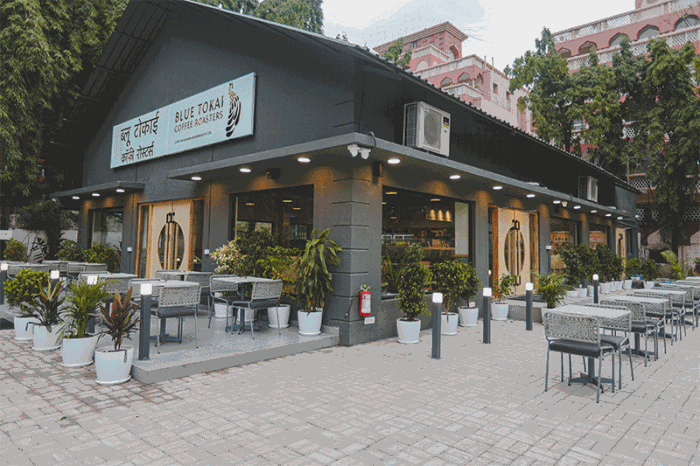
A Blue Tokai store in Pune | Photo credit: Courtesy of Blue Tokai
Anand was inspired to start abCoffee after getting a taste for European café culture while working in Romania. Upon returning to India, he noticed a significant uptick in retail packaged coffee consumption and saw a gap in the market to introduce an affordable branded café concept.
With a focus on sourcing Indian grown specialty grade coffee, abCoffee’s beverages start at INR 77 ($0.93) for a regular espresso and a standard latte will set you back INR 101 ($1.20). The business achieves this lower price point by sourcing coffee domestically from Karnataka’s Harley’s and Barbara estates and operating efficient take-away-focused stores.
“There are a lot of entry barriers for coffee as a lifestyle product in India”
Abhijeet Anand, CEO and founder, abCoffee
“India produces a lot of coffee, but domestic market prices are on par with UK or US – they should be much cheaper – and this historically deterred many Indian consumers from fresh coffee consumption,” says Anand.
Solid foundations for phenomenal growth
Despite entering the Indian market at a price point unaffordable for most consumers, international coffee chains have built viable businesses by tapping into the country’s high-income earners. Spurred by a burgeoning middle-income demographic, these chains and a new crop of domestic operators are now poised for rapid expansion.
The growth of established international coffee chains in emerging markets is nothing new, but one home-grown operator was already proving that branded coffee culture could succeed in India nearly 30 years ago.
Founded in 1996 by Karnataka-born entrepreneur VG Siddhartha, Café Coffee Day was a pioneer of India’s coffee chain culture. With the tagline ‘a lot can happen over coffee’, for years Café Coffee Day was one of the only operators in the country serving espresso-based beverages in third-place styled environments at scale.
By 2019 Café Coffee Day had grown to more than 1,750 stores with a 50,000-unit self-service coffee business across 243 Indian cities generating annual revenues of $200m – a remarkable feat in a coffee market still characterised as ‘developing’ today.
However, the apparent suicide of Siddhartha and the emergence of $840m company debt in 2019 was nearly the end of India’s flagship coffee chain, which closed hundreds of stores during the pandemic following a major restructure. However, under the leadership of Siddhartha’s widow Malavika Hegde the business is now on the road to recovery and remains the market leader by outlets with around 490 stores.
Today, a new crop of home-grown operators is catering to the next generation of Indian consumers, many of whom are far more well-travelled than previous generations and are increasingly buying into lifestyle brands.
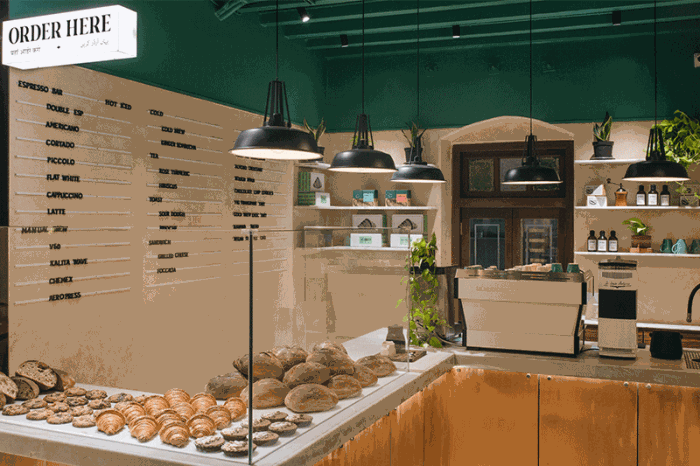
Subko Specialty Coffee Roasters store interior | Photo credit: Courtesy of Subko Specialty Coffee Roasters
Conservative estimates put India’s burgeoning middle-earner demographic at around 100 million people. However, recent research conducted by Udaipur-based non-profit People Research on India’s Consumer Economy (PRICE) concluded there are currently around 432 million ‘middle class’ Indians, defined as having an annual household income of between 500,000 and three million rupees ($6,700- $40,000) a year.
With around one-in-three Indians currently falling into this bracket, the definition is broad but earnings within this range are likely sufficient for most individuals to engage in discretionary consumption, including out-of-home coffee.
If just 10% of those top-earning consumers buy into branded coffee culture, India’s addressable coffee market is currently on par with a mid-sized European country – and set for phenomenal growth. Moreover, PRICE’s research forecasts this group will comprise nearly half of Indiaʼs projected 1.66 billion population by 2047.
In October 2023, Costa Coffee CEO Philippe Schaillee identified the size of the Indian market currently ‘gravitating towards specialty coffee’ at 20-25 million – meaning even conservative estimates still yield big numbers when it comes to current market potential. In another boost for aspiring coffee businesses, hiring data from global recruitment agency Michael Page shows the number of professional and office jobs in India grew 23% in 2022 – a key target demographic for coffee shops.
“We realised there was a whole next generation just waiting to change India’s coffee scene”
Namrata Asthana, Co-founder, Blue Tokai
“India, like all coffee growing countries from this area of the world, has typically been lower income. Over the last 10-20 years these countries significantly developed economically and there are now consumers earning enough to afford better quality products. That’s not just a trend we see within coffee, it’s across all consumer goods”, says Matt Chitharanjan, co-founder and CEO of Gurgaon-based specialty coffee roaster and café group Blue Tokai Coffee Roasters.
Founded by Chitharanjan and Namrata Asthana in 2013, Blue Tokai is emblematic of a new crop of homegrown operators raising the bar for quality while championing India’s coffee producers.
Blue Tokai has become a leading force in India’s specialty coffee movement and currently operates close to 90 stores across ten Indian cities. Through its four roasteries (three in India and one in Japan) and 2,000-plus wholesale customers, the brand’s core focus has been to make Indian specialty grade coffee more accessible both at home and abroad.
“Indian coffee is under appreciated globally. Itʼs very rare that you walk into a coffee shop in other parts of the world and see Indian coffee on the menu – but the quality of coffee grown by our partners and roasted by us could comfortably be served at any café in Melbourne, New York or London,” says Chitharanjan.
“The fanfare of the flat white in cities like London has very quickly translated over here”
Rahul Reddy, Founder, Subko Specialty Coffee Roasters
Blue Tokai currently works with a network of 50 Indian coffee growers and has partnered with over 80 to date. However, Chitharanjan and Asthana’s idea to market high grade Indian coffee domestically was initially met with scepticism.
As Asthana outlines, one Indian coffee farmer they approached initially rebuffed the idea of selling specialty arabica in the Indian market as unviable. However, listening to the conversation was the farmer’s son, who believed in the idea and persuaded his father to work with Blue Tokai.
This interaction is emblematic of a wider dynamic in India, where a young, increasingly upwardly mobile and optimistic population is driving innovation and growth across the economy. “We realised there was a whole next generation just waiting to change India’s coffee scene,” Asthana says.
abCoffee’s Anand estimates overall coffee consumption across India has increased 30% since 2018. With India’s vast population making its burgeoning premium coffee market viable for operators today, branded coffee chains have their sights firmly set on younger consumers to harness the vast opportunities of tomorrow.
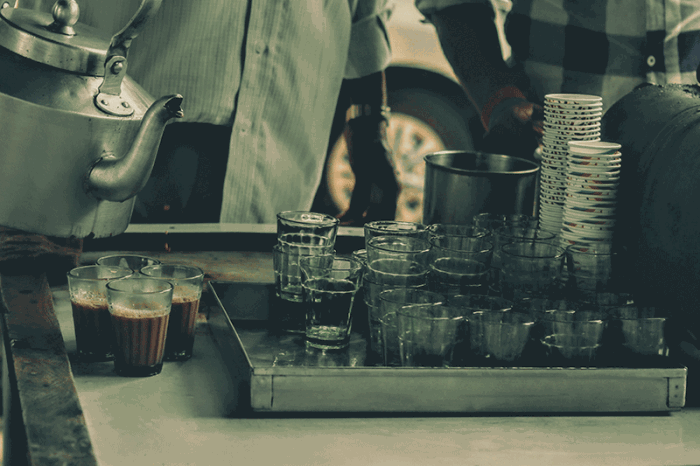
A $4 latte is still a hard sell against India’s ubiquitous $0.20 cup of chai | Photo credit: MD Mahdi
Rahul Reddy is another young Indian entrepreneur tapping into the countryʼs budding coffee youth and championing quality both at home and abroad. Utilising skills gained in a varied career encompassing marketing and geopolitical risk consulting – as well as a stint working as a Starbucks barista in California – in 2020 Reddy founded Mumbai-based specialty coffee roaster and craft bakehouse, Subko.
Today the business operates three boutique locations and a roastery showcasing micro-lots from the Garo Hills, Assam, Nagaland in India’s far northeast, the Paderu Vally in the eastern state of Andhra Pradesh and Karnataka to the west.
Accessibility is built into Subko’s brand DNA, with its name broadly translating to ‘everybody’ in Hindi and Urdu and also a play on the word ‘subcontinent ’. However, as coffee consumption in India grows, Reddy says consumers are already seeking out more sophisticated beverages.
“The fanfare of the flat white in cities like London has very quickly translated over here. There has been a meteoric rise of home brewing and pour-over demand,” he says, adding that interest in black specialty coffee is rising fast.
“The cold brew category is picking up massively and even though many consumers are starting with added flavours, a growing number who typically never consumed coffee without milk are shifting to black – and that evolution is happening very rapidly.”
Underlining Reddy’s lofty ambitions for the cream of India’s coffee crop, Subko now ships direct to consumers in the US, UK and the UAE.
Made in India
abCoffee, Blue Tokai and Subko are all harnessing the huge potential of India’s home-grown coffee. It’s an approach that makes economic sense by reducing import costs, but also taps into a deep sense of national pride Indian’s feel about home-grown businesses. In October 2021 Prime Minister Narindra Modi used a national address to urge all citizens to be “vocal for local” and buy ‘Made in India’ products.
When it comes to coffee, India has significant resources at its disposal. Data from the Government of India’s Coffee Board shows total domestic production was 352,000 metric tonnes for the 2022-23 growing year, making it the sixth largest producer by volume globally. Around 70% of that crop is produced in the southwestern state of Karnataka and the total domestic value chain employs around two million people. Up to 80% is destined for commodity export markets.
Nestled among the lush forests of Andhra Pradesh to the east, the Araku Valley is fast becoming a hub for specialty coffee production. The state of Andhra Pradesh, where the Araku Valley lies, currently generates a fraction of India’s total coffee output at around 12,265 metric tonnes, but high-quality arabica production from this region is key to India’s global coffee strategy.
Coffee production here contributes to the ‘One District One Product ’ (ODOP) initiative which provides government support to unique and high-quality products produced across India’s 28 states. Whether turmeric from Lakadong, walnuts from Kashmir or mangoes from Gujarat, “every district in India amplifies one product to be promoted domestically on the international market,” says Randhir Jaiswal, Consul General of the Consulate of India, New York.
“Our total coffee exports have grown from $719.42m in 2020-21 to $1.15bn in 2022-23 – there has been a significant jump in how much we produce and export to the world,” he adds.
“Coffee is not just a beverage, it’s a conversation and a part of our culture”
Randhir Jaiswal, Consul General of the Consulate of India, New York
As Jaiswal explains, coffee is an important part of India’s economic development. While many consumers in the West will have already sampled Indian coffee in popular blends, instant coffee and pods, the New York-based consulate is championing single estate and specialty coffee in international markets.
“We were doing $1m of exports to the US in 2019-20– now in 2022-23 we have gone up to $61m,” he says of India’s growing coffee specialty coffee production.
Coffee’s positive economic contribution to the Indian economy is evident, but high-quality exports are also helping to lift historically low-income tribal communities in the Araku Valley out of poverty. Much of this work is delivered through Indian non-profit, the Nandi Foundation, which for the past 25 years has worked to encourage regenerative agriculture practices, promote entrepreneurship and improve access to education, particularly for women and girls.
“The objective is to add value to the coffee growers and give them the best price. The best part is that most of the income goes to small and marginal farmers, tribal people who need support, and that has a huge socio-economic impact at the grassroots level. For all these reasons coffee has become very special,” says Jaiswal.
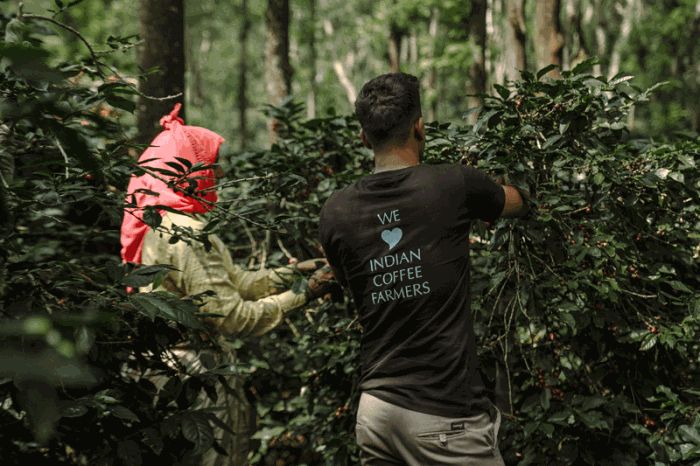
A Blue Tokai team member picking coffee at the Ratnagiri Estate in Chikmagalur, Karnataka | Photo credit: Courtesy of Blue Tokai
An unstoppable ascent
India’s prowess on the world stage is growing, as recently demonstrated after hosting the World Coffee Conference 2023 in Bengaluru. Coordinated by the International Coffee Organization (ICO) in partnership with the Coffee Board of India, Asia’s first four-day coffee event was attended by all 75 ICO member countries, more than 1,500 registered delegates and 10,000 business visitors from across the globe.
From fashion to fine dining, travel and technology, India’s increasingly affluent consumers are seeking premium lifestyle experiences well beyond coffee. Amid a rising tide of national optimism, home-grown entrepreneurship has become a major selling point for India’s youth, who are spearheading the rapid transformation of India’s specialty coffee industry.
As Indian coffee businesses ride this momentous wave, it is surely only a matter of time before these homegrown brands make their mark in Europe and the US.
“Coffee is not just a beverage, itʼs a conversation and a part of our culture,” says Consul General Randhir Jaiswal. When it comes to India’s coffee aspirations, it seems the sky is truly the limit for this rising coffee giant.
This article was first published in Issue 17 of 5THWAVE magazine.
Subscribe to 5THWAVE to receive each edition in print and digitally or sign up to our newsletter and be the first to read the latest articles and updates on World Coffee Portal research.
